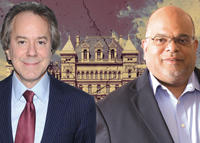UPDATED Wednesday, January 29, 6:13 p.m.: William Zeckendorf is angling to build an army of New York City homeowners to lobby lawmakers.
Residential property owners in the city could, if mobilized, become an influential group that brokerage leaders would stand shoulder-to-shoulder with the industry when it comes to legislation affecting real estate taxes and property valuation.
The idea is in early stages, according to the CEOs of brokerages Brown Harris Stevens and Halstead — both companies owned by Zeckendorf’s Terra Holdings. Zeckendorf, whose eponymous development firm is one of the most active in the city’s luxury residential market, did not respond to requests for comment.
“You need homeowners,” said Bess Freedman, BHS’ CEO. “That’s who these state senators will listen to. That’s who they represent. So they’ll listen when they’re writing letters and calling.”
“It’s all in the birthing stages,” she added.
It’s unclear whether the group would be exclusive to one or more Zeckendorf Development projects or more far-reaching.
Nationally, over 70 million people are part of homeowner associations, condominiums or housing cooperatives that are broadly known as community associations, according to the largest trade association in the space, the Community Associations Institute. In New York, there are about 3.65 million people living in homes within the state’s nearly 14,000 community associations, according to CAI. The trade group has a committee that tracks legislation and lobbies on behalf of homeowners.
Diane Ramirez, CEO of Halstead, said the catalyst for the effort was the proposed pied-à-terre tax, which appeared most recently last spring as part of the annual state budget negotiations. The proposal drew strong opposition from the industry on the grounds that it would have a chilling effect on non-resident buyers.
Read more



Zeckendorf personally got involved in opposing the bill, initially hiring lobbyist Patrick Jenkins for a two-week period leading up to the budget deadline and traveling to Albany alongside him. He also penned an op-ed in Crain’s calling the proposed pied-à-terre tax unconstitutional and its advocates’ economic analysis “alarming.” Instead, he proposed increasing city and state recording fees.
The proposed annual tax on pricey second homes was ultimately swapped for larger mansion and transfer taxes after issues over its “onerous” implementation couldn’t be ironed out. Notable concerns included how to tax an individual shareholder within a cooperative building or how to differentiate primary versus secondary-residence homeowners when they bought their property with a limited liability company.
Zeckendorf’s family is among the most prolific condo developers in the city’s history. Over a 35-year period starting in the 1980s, a predecessor company run by Zeckendorf’s father, Bill Zeckendorf, built more than 4,000 units. Zeckendorf’s current firm, which he runs with his brother Arthur, has pursued some of the most notable condo projects of the last decade, including 15 Central Park West, and most recently, 520 Park Avenue. The 64-story 520 Park has had some of the priciest sales in Manhattan since closings began in September 2018. The project has a $1.2 billion sellout and 24 out of the building’s 32 residences are sold, according to the developer.
Though most of the building’s 32 units were purchased through anonymous LLCs, billionaire investment banker Ken Moelis and vacuum cleaner mogul and British billionaire James Dyson are among the buyers publicly known.
In September, two state senators have said they would support reintroducing the pied-à-terre tax bill this session, albeit with modifications. (At the time, Corcoran Group chief Pam Liebman said, “We will rally the troops. We will literally march in Albany. We will do everything we can to make people understand that this is not a good thing.”)
Since April, Zeckendorf has had Jenkins on a monthly $15,000 retainer to lobby the office of the governor, State Senate and State Assembly until June 2020, public filings show.
Prior to 2019 ,the Real Estate Board of New York was widely seen as the de facto industry advocate. It’s unclear why Zeckendorf decided to lead the charge himself rather than work through REBNY.
A year later, however, Zeckendorf’s idea to mobilize homeowners is the latest in a string of recent moves within New York’s residential sector to get more active in lobbying lawmakers. The agent-focused group, the New York Residential Agent Continuum, hired Mercury Public Affairs as its lobbyist.
Brokerage leaders are also discussing how to mobilize agents in the future, according to Ramirez, who chairs REBNY’s residential brokerage board of directors.
Clarification: After publication, Zeckendorf Development noted that out of 520 Park’s 32 residence units, 24 had sold. That number excludes the building’s suite units for staff, which can only be purchased with a residence.
Write to Erin Hudson at ekh@therealdeal.com
